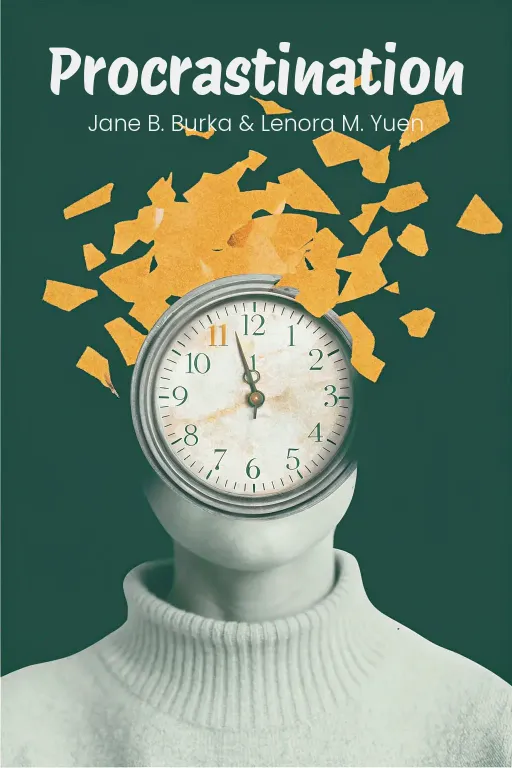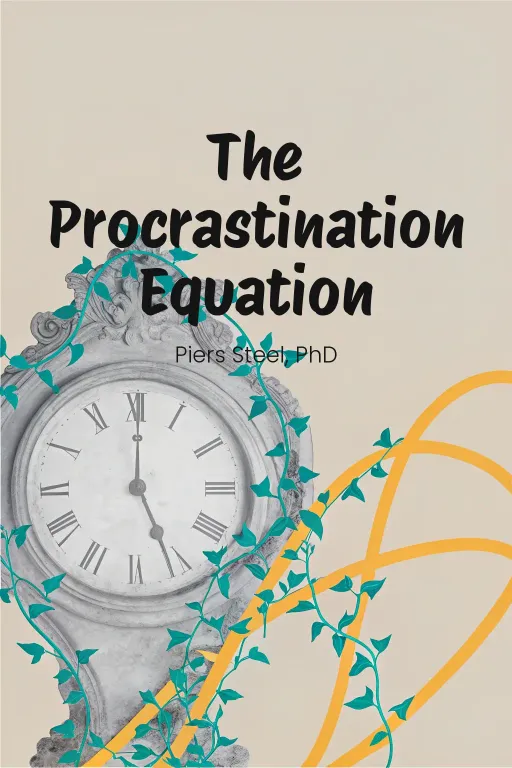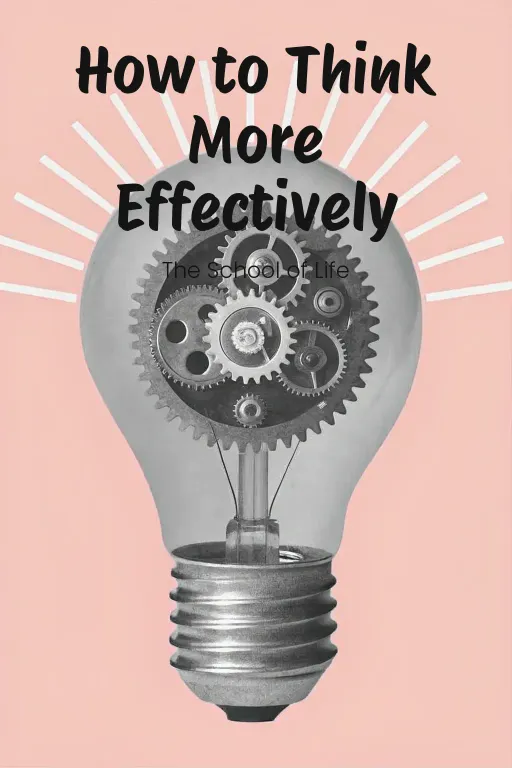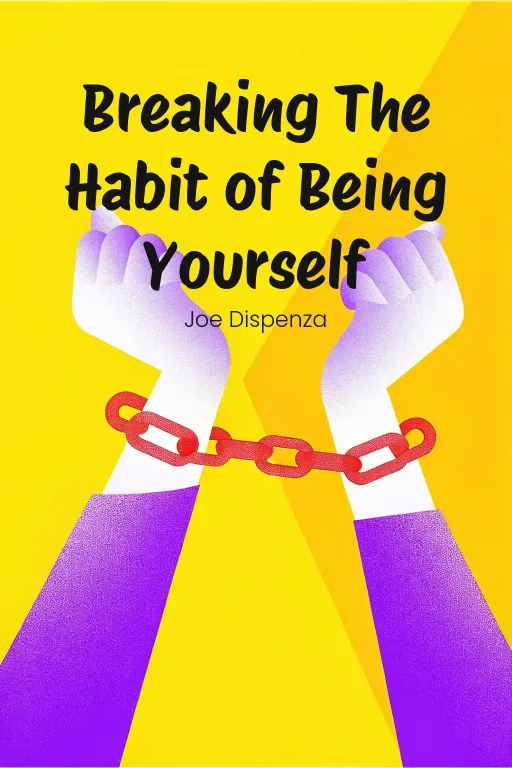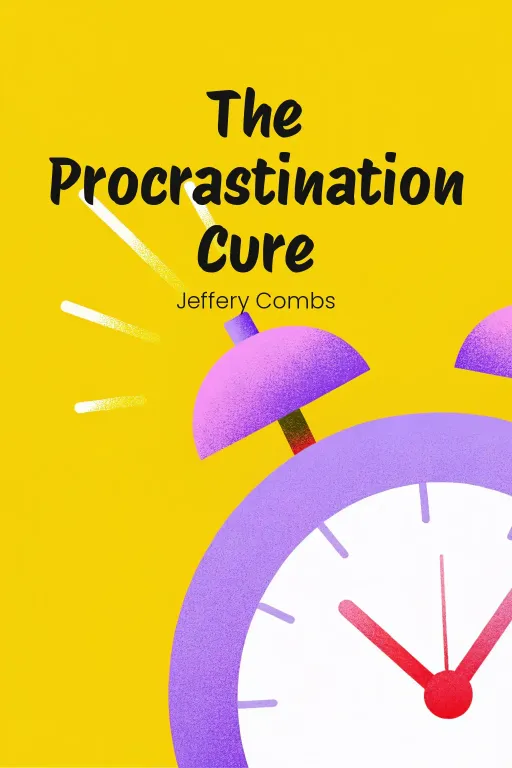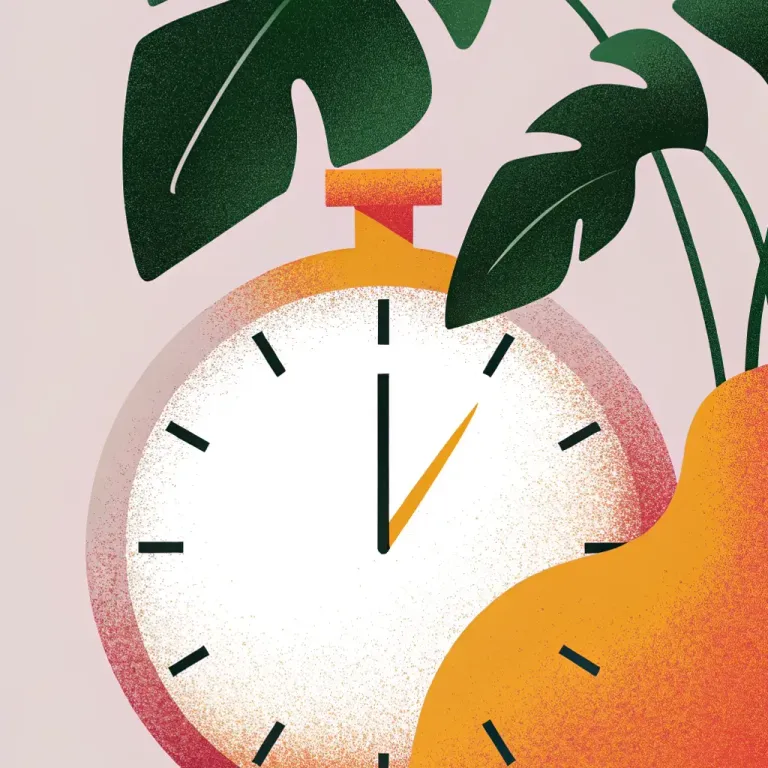
Crush Procrastination: Reclaim Your Time & Calm!
Podcast by The Mindful Minute with Autumn and Rachel
Why You Do It, What to Do About It Now
Crush Procrastination: Reclaim Your Time & Calm!
Part 1
Autumn: Hey everyone, welcome to the show! Today we're diving into something I think we can all relate to: procrastination. If you've ever felt that pressure from a deadline hanging over your head, or avoided something for so long it's basically become background noise, then this episode is definitely for you. Rachel: Procrastination, right? It's practically a universal skill. Whether it's that mountain of laundry or the doctor's appointment you meant to schedule months ago. But seriously, is it just a bad habit, or is there something more to it? That's what we're figuring out today. Autumn: Exactly! We're using the book “Procrastination: Why You Do It, What to Do About It Now” by Jane B. Burka and Lenora M. Yuen as our guide. It really gets into the heart of procrastination – showing it's not just a lack of motivation or simple laziness. It’s this complex mix of fears, emotions, and learned behaviors, influenced by psychology, biology, and even our culture. And the best part? It doesn't just point out the problem, it gives you ways to actually tackle it. Rachel: Yeah, this isn't your typical "just power through" pep talk. It explores how deeper fears, like the fear of failure, success, or even intimacy, can keep us stuck. And, a little spoiler: those quick-fix productivity tips you find online? They're not the magic bullet you might think. Autumn: Precisely! So, here’s what we're planning on unpacking today: First, we're looking at the hidden fears that actually drive procrastination. And trust me, it goes way beyond just wanting to avoid hard work. Rachel: Next up, we’re breaking out the tools. We're talking real, practical strategies that can actually make a difference. Not just for students pulling all-nighters, but for parents, professionals, really anyone who's trying to juggle the craziness of life. Autumn: And finally, we'll zoom out to the bigger picture: building self-compassion and resilience. Because you absolutely “can” deal with procrastination, learn from it, and come out stronger on the other side, imperfections and all. Rachel: Think of this episode as like, part detective work, part practical toolbox, and maybe even a little bit of free therapy. Ready to get started? Let's jump right in.
Understanding the Psychological Roots of Procrastination
Part 2
Autumn: Okay, Rachel, let's dive into the psychological roots of procrastination. This is really the foundation for understanding everything else. This book makes it so clear, procrastination isn't just a time management issue. It's actually deeply connected to fear. We're talking about fear of failure, fear of success, and even fear of intimacy. These fears “really” shape our actions, often without us even realizing it, you know? Rachel: Right, okay, fear of failure first. That one feels like the classic procrastination driver, doesn't it? The stakes get high, and suddenly, it's easier to just avoid the whole thing rather than risk, well, not getting it "right." But the book takes it a step further, doesn't it? It's not just about failing, it's about what that failure says about you, right? Autumn: Precisely. For many, failure isn’t just about missing the mark; it’s a threat to their very self-worth. Take the writer example in the book, you know, the one who keeps delaying sending their manuscript for feedback. Seems like they're not disciplined, or they don't care enough, right? But actually, they're terrified that critique of their work will be like critique of them as a person. Rachel: And, once you see failure as a judgment on your entire existence, no wonder people freeze up. Yeah, it creates this vicious cycle... you avoid the thing, which fuels more self-doubt, which makes you avoid it even more. It's like an emotional quicksand. Autumn: Exactly. And, you know, it's actually heartbreaking because this fear often originates in childhood. If you were regularly criticized or only praised when you succeeded, you might've internalized the idea that your value is tied to your achievements. And that belief follows you into adulthood, quietly dictating your behavior. Rachel: So, basically, every bad report card or parental criticism we've buried deep down is still pulling strings. Fantastic. So, how do you start breaking that cycle? Please don’t tell me we just "think positive thoughts". Autumn: Nope, it's more nuanced. The book actually talks about cognitive reappraisal, which is essentially reframing your thoughts around failure. Instead of seeing failure as a catastrophic event, you begin to see it as feedback, as an opportunity to grow. It's about creating distance between your self-worth and your performance, right? Rachel: Right, okay, putting failure in a box where it's just failure, not some giant neon sign saying "You’re a terrible person." Got it. But, let's pivot a bit, what about fear of success? I mean, who's actually afraid of succeeding? Isn't that what everyone wants? Autumn: Well, it seems counterintuitive, but it’s a real thing. For some people, success comes with its own anxieties, like increased scrutiny, higher expectations, and even guilt. Think about Raj in the book, the high-achieving student. He deliberately procrastinated on assignments because doing well made him feel isolated from his peers. Rachel: Oh yeah, the old "survivor's guilt" move. He's worried success will make him unrelatable or unlikable, right? So, instead of alienating his friends, he sabotages himself by missing deadlines. Autumn: Exactly. It's self-sabotage as a way to avoid the perceived burden of standing out. The book points out that this often stems from a belief that success comes at a cost, whether it's relationships, free time, or even someone else's approval. Rachel: So, how does someone like Raj actually deal with that? I’m guessing telling him to “just care less about what people think” isn't really going to cut it. Autumn: Definitely not. What’s helpful here is self-dialogue, actively practicing compassionate conversations with yourself. Raj, for example, could remind himself that his success doesn’t have to come at the expense of his friendships. And seeking support from his peers to share his struggles might also help bridge that gap. Rachel: It sounds like success might be less scary when you let other people into the journey. Okay, moving on. This next one surprised me: fear of intimacy and separation. Procrastination as an avoidance strategy in relationships? Autumn: Yes! It's fascinating. Procrastination doesn't just show up in our work lives; it can affect our connections with others. Take Maria and Peter from the book—Maria avoided those tough financial conversations because she was afraid of conflict or rejection. Rachel: But, by putting off those discussions, she was building a wall between them instead, right? I mean, irony alert, because trying to avoid separation can actually create it. Autumn: Exactly. And the book explains that fears of intimacy or separation often stem from early attachment experiences, like growing up in households where emotional needs weren't consistently met. For Maria, addressing her procrastination meant understanding that her habits were rooted in these old fears, not the current reality of her relationship. Rachel: So, what's the solution here? Just…talking through it? Autumn: In part, yes, but it has to be intentional and gradual. The book suggests techniques like emotional regulation and practicing small steps, like having focused, constructive conversations. This helps rebuild trust and address those underlying fears. Rachel: Okay, quick recap: We’ve got fear of failure making people freeze, fear of success making them self-sabotage, and fear of intimacy pushing them to avoid tough conversations. But there’s another element at play here too—implicit memory, right? Autumn: Yes, this is huge. Implicit memory refers to those unconscious emotional imprints from our past that influence our behaviors without us even realizing it. The book uses the example of Darren, a corporate professional who delayed sending important emails because of a fear of making mistakes. Turns out, his procrastination was fueled by memories of being harshly criticized for errors as a child. Rachel: So, even though Darren rationalized his delays as “perfectionism”—you know, “I just need more time to get it right”—he was really just trying to avoid the shame of being judged like he was back in school. Autumn: Yes, exactly. What's important here is surfacing those implicit memories. The book recommends tools like journaling or mindfulness to help bring those old patterns into awareness. For Darren, realizing that his fears were tied to a learned response allowed him to create new, healthier habits. Rachel: It sounds like this whole process—whether we’re talking about fear of failure, success, intimacy, or implicit memory—is really about awareness. Procrastination might feel random or irrational, but there’s always something deeper driving it. Autumn: That's the core takeaway. Procrastination isn't a character flaw; it's a signal. By understanding the psychological roots, you're not just fixing a behavior, you're addressing the fears and beliefs that fuel it. And that opens the door for real change.
Strategies for Overcoming Procrastination
Part 3
Autumn: Recognizing those psychological roots really opens your eyes to why procrastination happens, doesn't it? But that awareness is just the starting point. Now, let's dive into the “what to do about it” side, the strategies for actually “overcoming” procrastination. That's where things get interesting. Rachel: Exactly! Let's get practical. The rubber meets the road, as they say. And okay, so the book lays out strategies focusing on, self-awareness, goal-setting, emotional regulation, time management. These aren't just superficial tips, right? They're meant to address the core reasons we procrastinate. Let's start with self-awareness. It's the foundation of everything else, surely. Autumn: Absolutely. Self-awareness – it sounds so simple, doesn’t it? But “be more self-aware” is about as helpful as saying "just be more mindful." What does self-awareness “actually” look like when you’re tackling procrastination? Rachel: Yeah, what does that “mean”, practically? Autumn: It’s about spotting those patterns, understanding the feelings that kick off your procrastination. The book mentions a "procrastination inventory." Basically, you keep track – mentally or on paper – of the tasks you avoid and the feelings you link to them. Say you keep putting off a presentation, take a sec to think: Are you overwhelmed? Or are you afraid of being criticized? Rachel: So, you're like, detective, investigating your own habits. You're not just feeling guilty, you're actively trying to understand “why” you're putting things off. I’m guessing that's the Janelle example? Autumn: Spot on. Janelle, a marketing pro, kept avoiding client presentations. Then, she started using that inventory. She realized the issue wasn't the work itself—it was her fear of the Q&A afterward. That click was a game-changer for her, because she could then focus on prepping better to reduce her anxiety. Rachel: See, “that's” a useful shift. "Stop procrastinating" doesn't work. Shifting to "How can I feel less anxious?"... that's actionable. Okay, so people understand the self-awareness bit. What's next? Autumn: Goal-setting! The book pushes the SMART framework -- Specific, Measurable, Achievable, Relevant, and Time-bound goals. The idea is to break down these enormous, intimidating goals into smaller, actually doable steps. Remember Daniel, the PhD student? Rachel: Oh, right. The guy spinning his wheels because "finish my thesis" is... well, more of a life goal than a task! What did his SMART goals look like? Autumn: His advisor helped him break it down. Instead of the whole thesis, he set a smaller goal: Write 300 words a day on a section, for two weeks. He tracked his progress, those small wins kept him going, and he really built momentum. Small, specific goals just “feel” doable, and that helps push past that paralysis. Rachel: I like that. Building a staircase instead of staring at a cliff. But what about the people who set goals but still struggle, because emotions get in the way? Autumn: That’s where emotional regulation comes in. The book talks about mindfulness and cognitive reappraisal. Mindfulness: staying present, managing stress through things like deep breathing. It puts a pause between feeling overwhelmed and just reacting. Rachel: Mindfulness – makes sense. But cognitive reappraisal? Sounds a bit… complicated maybe? Autumn: It's more intuitive than it sounds. It’s about reframing negative thoughts to lessen their power. So, if someone is terrified of presenting because they think: "What if I mess up and everyone judges me?" they could reframe it as: "This is a chance for me to improve, even if it isn't perfect!" Rachel: Rewriting the script in your head, yeah. Angela, right? She saw every meeting as a high-stakes ordeal. Autumn: Exactly. Angela used reappraisal to start seeing those meetings as chances to grow instead of pressure cookers. Small change in perspective, but huge impact on how she handled it. Rachel: So, mindfulness and reframing are like emotional circuit breakers. They help you regain control when anxiety's driving. Got it. But even with emotions in check, you need systems, right? Time management. Autumn: Absolutely! And the book has some cool techniques here, like the "un-schedule" and the Swiss Cheese method. Let's start with the un-schedule - flipping how people plan their day. Rachel: Okay, I'm intrigued. Autumn: Instead of filling your calendar with tasks, you start by scheduling fun stuff, breaks, hobbies, time with friends. “Then” you fit work tasks around it. It's about valuing your downtime, which staves off burnout and makes work less daunting. Rachel: Ah, Lucas! The graphic designer who felt like a robot because of his all-task, no-fun schedule! Autumn: That’s him. When Lucas switched to this, he prioritized morning coffee, sketching for fun. Regular breaks meant more energy for work, and he finished projects ahead of time. Rachel: Cool! Counterintuitive, right? Scheduling breaks “first” makes work feel less… awful. And the Swiss Cheese method? Please, tell me it involves actual cheese. Autumn: Sadly, it's metaphorical. The Swiss Cheese method is about "poking holes" in a task by breaking it into small bites. Perfect for overwhelming tasks, because you start with minimal effort—like drafting an outline for 10 minutes. Rachel: That reminds me of Lila, prepping for her presentation! Those brainstorming sessions became a full presentation ahead of schedule! Autumn: Exactly! Lowering the energy needed to start. Once you take that little step, momentum kicks in. It's a great addition to time management tools like the un-schedule. Rachel: Okay, so, self-awareness – pinpoint the emotional triggers. Goal-setting – provides structure. Emotional regulation – manages stress. Time management – makes it all actionable. These aren't isolated fixes, are they? They're an ecosystem to address procrastination at its core. Autumn: Exactly. And that creates lasting change, not just quick fixes. You use these strategies in a way that suits you, and you're not just improving productivity. You’re changing how you see your work, your feelings, and yourself.
Cultivating Resilience and Self-Acceptance
Part 4
Autumn: So, with these strategies, you can really start to reshape those procrastination habits into being more proactive. But it’s not just about fixing procrastination, it’s about something deeper: building resilience and accepting yourself. It’s about getting the emotional tools and mindset that helps you grow and feel good long-term. Today, we’re diving into three key areas: embracing imperfection, building emotional resilience, and setting up supportive environments. They’re not just ways to beat procrastination, but ways to think about growing as a person, more broadly. Rachel: Okay, so we're moving away from the specific tactics for a bit and looking at the bigger picture—what it really means to develop as a person, not just ticking boxes on a checklist. Autumn: Right. Because, let’s be honest, Rachel, most of us aren’t procrastinating because we're simply "lazy." It’s the psychological pressures and emotional baggage we all carry. So, the fix isn’t just about doing “more”, it’s about “thinking differently”, wouldn't you agree? Rachel: Gotcha. So, first up: embracing imperfection. The book says perfectionism is a big reason we procrastinate. Honestly, it’s tough to let go of the idea that things need to be “just right.” So, why is embracing imperfection such a game-changer? Autumn: Well, perfectionism is a trap. People think, "If I can’t do this perfectly, it's not worth doing.” This all-or-nothing idea makes it so easy to procrastinate because the stakes suddenly feel super high. The book explains how this fear of not being perfect often connects back to beliefs we learned as kids—like always needing to get approval. So, embracing imperfection, it changes things: instead of chasing some impossible idea of being flawless, you focus on making progress. Rachel: Progress over perfection. Sounds good, but it’s probably not that easy to actually do. Remember Anna, the grad student in the book, who was stuck on her research paper? What helped her get unstuck? Autumn: For Anna, reframing her goal was key. Instead of trying to write a perfect draft all at once, she decided that each draft could, and should, have imperfections. She worked in small chunks of time—just 25 minutes—and made steady progress. She celebrated the process rather than obsessing over the final paper. Also, writing in her journal daily, where she noted small wins, really cemented the idea that progress itself was valuable. Rachel: Ah, the liberating power of having reasonable expectations! You’re basically giving yourself permission to be human, which, by the way, we all are. But let’s dig a bit deeper. Isn’t this also tied to how we define success? Our view of success can either help us move forward or trap us in avoidance. Autumn: Absolutely. The book wants us to see success as a learning journey, not a flawless show. When you acknowledge and celebrate those small wins—even if they’re not “perfect”—you build confidence and create positive momentum. It’s about switching from focusing on results to valuing the effort and growth that comes with the process. Rachel: Okay, I get the theory, and Anna’s story makes it feel more real. But here’s my skeptical side coming out: If perfectionism is a learned behavior tied to our sense of self-worth, won’t it take more than a few journal entries to undo? How do you really shift those deep-seated beliefs? Autumn: That’s where emotional resilience comes in. Building resilience isn’t just about accepting imperfection; it’s about arming yourself with the tools to handle the emotional ups and downs that come with growth. The book talks about two really helpful techniques for this: mindfulness and cognitive reappraisal. Rachel: Right, tools to help you handle whatever life throws at you. Let’s start with mindfulness, because it feels like everyone's talking about it these days. But what does it look like when you're dealing with procrastination? Autumn: Basically, mindfulness teaches you to become an observer of your thoughts and emotions. It’s about noticing those stressful thoughts or feelings that trigger procrastination, without judging them or reacting right away. Take Liam, the software engineer from the book, for instance. By practicing mindfulness, he noticed the specific self-critical thoughts that made him avoid tough tasks. Over time, that awareness gave him the space to pause, instead of just falling into those old procrastination habits. Rachel: So, mindfulness is like holding up a mirror to your brain and saying, “I see what you’re doing there.” But just noticing isn’t enough. That’s where cognitive reappraisal comes in, right? You take that negative self-talk and rewrite it? Autumn: Exactly. Cognitive reappraisal is about actively challenging and reinterpreting those internal narratives. So, for Liam, instead of seeing tough assignments as proof that he wasn't good enough, he saw them as chances to learn and grow. This shift in perspective helped him tackle challenges without getting stuck in self-doubt. Rachel: All right, I’m on board. Mindfulness and reframing make sense as personal tools. But let’s be real: your environment—the people, the places, everything around you—also has a huge effect on whether you succeed or fail. What does the book say about creating a supportive environment? Autumn: It’s crucial. The idea is that lasting resilience and self-acceptance thrive in environments that encourage good habits and minimize distractions. This doesn’t mean you need to go live in a cabin in the woods. It means making small changes to your spaces and social circles. For instance, Clara, the architecture student, was constantly distracted by her cluttered workspace. She took simple steps like cleaning up her desk, putting her phone away, and joining a peer study group. Rachel: Oh, Clara’s peer group was key for her, right? Having people to hold her accountable added structure and support. When you’ve got the right environment, you reduce the mental drag that makes procrastination such a tough enemy. Autumn: Exactly. It’s not just about removing distractions; it’s about setting up systems that support your goals. Whether it’s redesigning your workspace, using an app to block social media, or finding an accountability partner, these small changes can make a big difference in making sustainable growth possible. Rachel: So, to summarize, developing resilience and self-acceptance involves both internal and external work. Internally, you’re changing your mindset—embracing imperfection, managing your emotions. Externally, you’re setting yourself up for success with tools and environments that actually support you instead of holding you back. It’s like having a double layer of protection against procrastination. Autumn: Yes, that’s a great way to put it. By addressing both the emotional reasons behind procrastination and the practical aspects of it, you not only overcome that habit but also create a mindset and a life that support meaningful, long-term growth.
Conclusion
Part 5
Autumn: Okay, so, to bring it all together, we've really seen that procrastination is way more than just being bad at managing time or, you know, being lazy. It's often this deeper emotional thing, tangled up with fears—fear of messing up, fear of actually succeeding, and sometimes even fear of getting too close to people. And as we've discussed, kicking this habit needs more than just simple solutions. It's about digging into those psychological reasons, really understanding yourself, and changing those beliefs that have shaped how we think. Rachel: Exactly. And it's not just about knowing all this stuff, right? You've gotta do something with it. Whether it's setting those SMART goals—you know, specific, measurable, achievable—or changing how you think about negative things, or using the tools like the un-schedule and Swiss Cheese method, the book really emphasizes that these things work together. You can't just pick one and hope it fixes everything. They help us build better habits. Autumn: Definitely. And personal growth isn't just about fixing problems. It's about building our ability to bounce back and really be kind to ourselves. When we accept that we're not perfect, change how we see success, and build environments that support us, we're not just fighting procrastination. We're building an emotional toolkit that makes every part of our lives stronger. Rachel: So, the big idea here: procrastination is like a signal, not a sign that you're a failure. Instead of getting down on yourself, see it as a chance to stop, think, and make some changes. Start small, stay curious, and remember that any progress, even if it's not perfect, is a victory. Autumn: Absolutely. And with that, we really hope today's chat has given you some new insights and some practical tools to deal with procrastination and build a stronger and kinder relationship with yourself. Thanks so much for listening, and we'll catch you next time!


